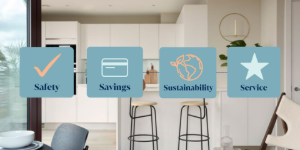The SilverDoor Blog
How to Overcome Digital Fatigue in the Online Workplace
From London to Madrid: A SilverDoor Placement Secondment Experience
The SilverDoor secondment scheme gives our teams the unique opportunity to experience working life in another of our seven global offices. This year, we extended the scheme to our placements –...
Why are serviced apartments the best accommodation choice for corporates?
Their wealth of commercial, financial and well-being benefits is drawing more and more corporates to serviced apartments as their preferred choice of business travel and mobility accommodation;...
How Can the SilverDoor Online Booking Tool Transform Your Travel Programme?
Get to know the SilverDoor Online Booking Tool In today’s digital landscape, consumers are always just a few clicks away from their next purchase. Despite this, booking accommodation for business...
Could Blockchain Change How We Pay for Business Travel?
What is Blockchain? Blockchain is a type of digital ledger technology that records transactions across many computers in a secure, tamper-proof way. Instead of relying on a single central authority...
SilverDoor’s Insights & Social Event in Singapore: Driving Growth and Connection Across APAC
We recently hosted an Insights and Social event in Singapore, bringing together industry experts, partners, and clients to share market updates, regional trends, and forward-looking perspectives on...
SilverDoor's Market Update - May 2025
SilverDoor's Market Update is a comprehensive review of the global travel landscape using our own booking data, wider economic context, and our experts' experience and predictions to build a picture...
The Top 6 Serviced Apartments in Bengaluru
Widely known as India’s Silicon Valley, Bengaluru (Bangalore) has cemented its reputation as a global IT powerhouse and a thriving business hub. Home to prestigious educational and research...
A Business Travel Guide to Barcelona
Staying in Barcelona, Spain Barcelona is a vibrant city on Spain's North Eastern coast and serves as the capital of the Autonomous Community of Catalonia. A hub of commerce and culture, Barcelona is...
Travelling For Business in India? Choose Verified, Secure Accommodation
_______________________________ Brought to you by our Partner Relationships Team Travelling for business in India presents a wealth of opportunity - but choosing the right accommodation can be...
Business Traveller Guide to Pune, India
Staying in Pune, India Once the powerful centre of the Maratha Empire, Pune has evolved into one of India's most dynamic and fastest-growing cities. Often referred to as the "Oxford of the East", a...
Our Top Takeaways from ITM INSPIRE 2025
This month, we set off for Newport, joining other travel industry professionals at the ITM INSPIRE 2025 conference. Between the morning yoga sessions and evening networking, it was the panel...
Marcus Angell Wins Outstanding Achievement Award at SAA 2025
We are delighted to announce that SilverDoor and Habicus Group Founder and Chairman, Marcus Angell, has been awarded the prestigious Outstanding Achievement award at the 2025 Serviced Apartment...
The 2025 SilverDoor Industrial Placement Swap Experience: London or Lancaster?
In February 2025 our London and Lancaster SilverDoor placements undertook a 'Placement Swap' - visiting, working in, and experiencing a week in a new city. There were two fun-filled and jam-packed...
25 Years of Helping to Keep Business Travellers Safe
Since our beginnings in the early 2000s, the safety and well-being of business travellers has been a top priority for SilverDoor. From global challenges such as COVID-19 and natural disasters to...
25 Fun Facts about SilverDoor That You May Not Know
Have you heard, 2025 is SilverDoor's 25th anniversary? You might have been here since the very beginning or you may only just be getting to know us, but there's a few things you might not know about...
25 Years of Exceptional Service, and Beyond
This month, SilverDoor celebrates 25 years of serving business travellers—a milestone that not only reflects how far we’ve come but also where we’re headed. From our beginnings in London in 2000...
Relocating to Singapore? Here’s everything you need to know before you move
Relocating isn’t always easy, especially when it involves relocating for work. Whether you’re moving alone or with family, the process can quickly become overwhelming. There's a lot to consider,...
Corporate Housing Trends in the USA - 6 key takeaways from CHPA Connect 2025 San Diego
The CHPA Connect 25 (Corporate Housing Providers Association) conference united over 550 industry professionals in San Diego, offering in-depth insights into stronger collaboration between property...
SilverDoor's Market Update - February 2025
SilverDoor's Market Update is a comprehensive review of the global travel landscape using our own booking data, wider economic context, and our experts' experience and predictions to build a picture...
Business in Perth - 6 Reasons Perth is Western Australia’s Economic Capital
The affluent capital of Western Australia and a flourishing business, cultural, and commercial centre, Perth is the resource capital of the Indo-Pacific Region. Offering a wealth of strategic business...
A Business Travel Guide to Tokyo
Staying in Tokyo, Japan Tokyo is a futuristic metropolis where cutting-edge technology meets centuries old tradition. Once named ‘Edo’, Japan’s political centre would eventually grow into one of...
Tried and Tested: Serviced Apartments in Manchester
Manchester is a lively city and one of our key destinations. With its thriving nightlife, and illustrious academic and professional scene, it’s no surprise that Manchester is such a sought location...
Expectations of Gen Z: The Business Travel Preferences of Tomorrow's Decision Makers
The era of Generation Z business travel is no longer a future consideration. Born between 1997 and 2012, Gen Z professionals already make up 27% of the OECD ‘high or upper middle-income countries’...
What role does ESG play in recruitment and talent acquisition?
ESG is a guiding principle which measures the various types of impact a business or organisation has on the world around them. E (environmental) refers to an organisation’s impact on the environment...








































